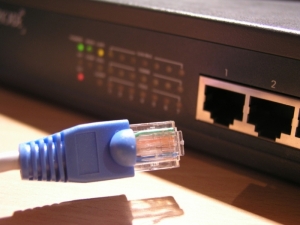 An article in the Wall Street Journal caught my eye: “FCC Questions AT&T Over Investment Pause: Company Freezes Plans to Build Ultrafast Internet Service.” The reason for the pause is the FCC’s flirtation with the idea of net neutrality.
An article in the Wall Street Journal caught my eye: “FCC Questions AT&T Over Investment Pause: Company Freezes Plans to Build Ultrafast Internet Service.” The reason for the pause is the FCC’s flirtation with the idea of net neutrality.
A government policy of net neutrality would require internet service providers—like broadband companies—to enable access to all content and applications no matter the source and without additional charges for particular products or websites.
This debate is in the news lately because of the issue of whether cable companies that control broadband should be able to charge extra to content companies like Netflix that make greater use of the broadband, or to offer content companies a faster and better route that isn’t available to other companies (for a price, of course). The FCC has been debating this policy, and the issue is wrapped up in the FCC and DOJ’s review of the Comcast-Time Warner merger. President Obama recently came out in support of net neutrality, which adds pressure on the FCC to adopt the policy.
So where does AT&T fit into this?
They are in the process of gaining approval to purchase the satellite company, Direct TV, which is a competitor to the broadband services from cable companies like Comcast and Time Warner. After President Obama issued a statement supporting net neutrality, AT&T announced that it would freeze plans to build ultrafast Internet service in light of new uncertainty around the government’s net-neutrality policy.
Here is the problem: Net neutrality turns broadband service into a more commoditized business. If you are in the business, you must charge everyone equally—the content providers that is—which means there is substantially less room for innovation.
Right now the cable companies offering broadband have substantial market power because they offer the fastest broadband to customers in each locality. Substantial resources over time have built-up the necessary framework and connections to offer broadband service to customers.
When a business becomes commoditized, there are fewer aspects of competition. That is, the product is substantially the same no matter where you get it, so price becomes the biggest area of competition. Businesses then compete by innovating on how to reduce costs and building economies of scale, which usually reduces costs. They do not, however, innovate on improving the quality of the product because, by definition, the product is the same.
If the FCC were to require a net-neutrality policy, it would remove substantial areas of potential competition between the entrenched monopolist broadband (i.e. cable) companies and potential competitors. So competition would primarily be based on cost reduction, which usually comes down to economies of scale.
Who is going to win that competition? The cable companies offering broadband (Comcast and Time Warner, and possibly the combined company).
AT&T sees that a net-neutrality policy offers less possibility of profits from innovation and different services, so it rationally is considering scaling back its entry into the market.
The broadband/cable companies have every cost advantage already and by foreclosing and discouraging competition from future innovators, net neutrality will merely entrench them as monopolists.
What is ironic about the Comcast-Time Warner merger debate is that many of the same people that are expressing the most worry about a Comcast-Time Warner merger and a broadband monopoly are the same people that are pushing net neutrality, which would entrench these monopolists, whether combined or not.
Anyway, there are many issues to consider with a giant merger like this, but this is an issue that I think has gone under the radar more than it should.
 The Antitrust Attorney Blog
The Antitrust Attorney Blog


